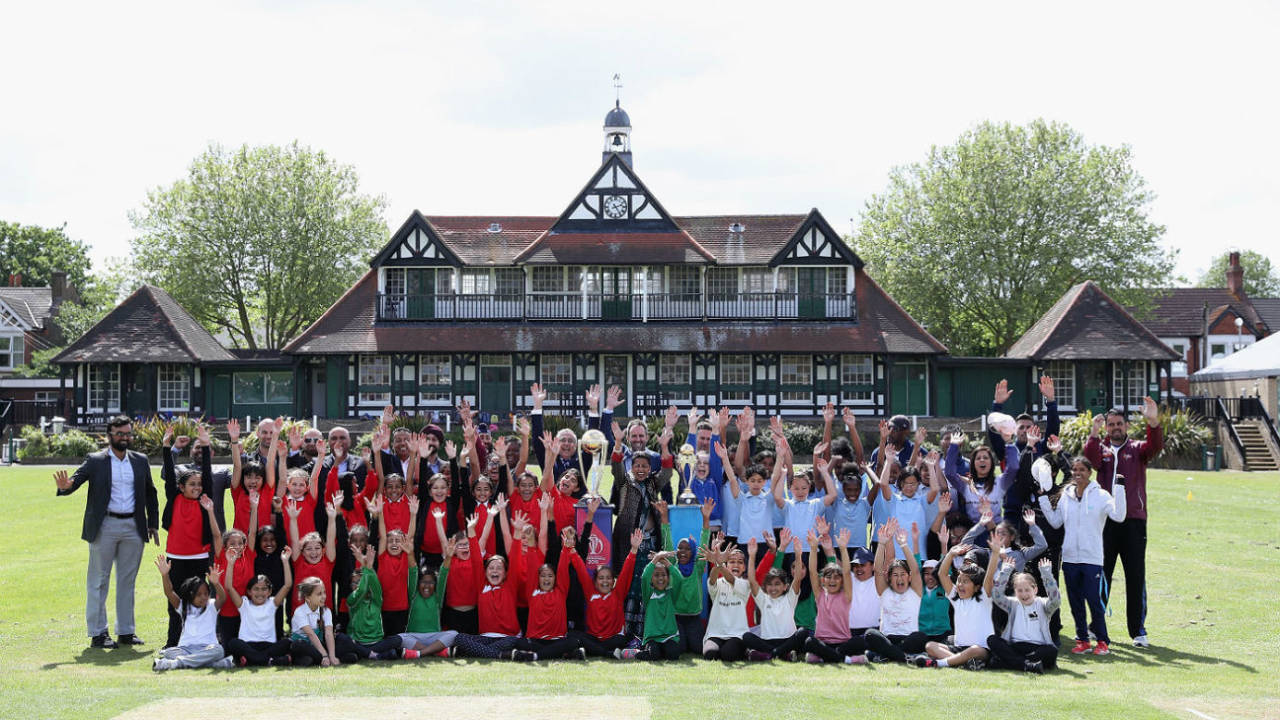ECB's South Asian initiative is a "once-in-a-generation" opportunity for integration, says Lord Patel
Action plan marks concerted effort from ECB to tackle disconnect with community that makes up 30% of recreational cricketers
Andrew Miller
May 10, 2018, 9:04 PM
The launch of the South Asian Communities Action Plan in Leyton, East London • Getty Images
Lord Patel of Bradford has hailed the ECB's bid to harness the talents, enthusiasm and depth of the British Asian community as a "once-in-a-generation opportunity", at the launch of an initiative that seeks to tackle the disconnect between mainstream English cricket and the demographic that makes up more than 30% of the sport's recreational players.
The South Asian Communities Action Plan is a 106-page report featuring 11 specific recommendations, including a commitment to foster greater diversity in coaching, as well as the introduction of bursaries to help talented young Asian players and their families bear the costs of coaching and equipment as they progress through the ranks.
It comes at the culmination of two years of consultation between the ECB and Asian community leaders, among them the National Asian Cricket Council (NACC), which was formed in 2014 to provide a unified voice for the myriad creeds and cultures that make up more than a third of the country's recreational cricketers but, to date, just 4% of the professional game.
And despite significant breakthroughs in recent years, including the rise to prominence of Moeen Ali as an England allrounder, and the appointment of Leicestershire's Wasim Khan as the first Asian chief executive of an English county, the ECB's failure to engage Asian communities has been reflected particularly starkly in ticket sales, with just 3% of fans at England games coming from such backgrounds.
However, 40% of the tickets sold during last year's Champions Trophy were picked up by fans of Asian heritage - for a tournament in which Pakistan, India and Bangladesh joined England as the semi-finalists - and Patel believes that the timing of this initiative, and the run of marquee events coming up in this country over the next two years, augurs extraordinarily well for its success.
"This is a once-in-a-generation opportunity," Lord Patel told ESPNcricinfo. "The stars have aligned. We had a Champions Trophy last year, which excited loads of the South Asian community; this year, we've got the biggies, India and Pakistan, then we tour Sri Lanka, and next year we've got the Cricket World Cup.
"Now if we can't make things happen in that environment, we'll never make it happen," he added. "We've got leadership of the ECB who want to make it happen, we've got leadership in counties that want to make it happen, and the government are saying we need kids out and about, healthy and fit.
"We know that cricket brings people together. It's not about Asian kids, black kids or white kids, it's about all kids, boys and girls coming together, enjoying something through the power of cricket."
Tom Harrison, the ECB chief executive, acknowledged that the mainstream game had been slow to reach out to Asian communities in the past, but echoed Lord Patel's faith that the board's new initiative could make up for lost time.
"If we do this well, it won't just be a South Asian community plan, it will be a plan for cricket's growth, and that's the ultimate objective here," Harrison told ESPNcricinfo.
"We're delighted to launch this today after a long consultation process with Asian communities around the country, and we hope and expect it will bring down some of the barriers to entry at all levels of the game.
"We've had good intentions in the past but we haven't cracked it," he added. "But this plan is endorsed by South Asian communities, particularly in urban areas, and through a deeper understanding of multi-cultural, multi-faith, multi-lingual communities, we're learning a lot about bringing down some of those barriers."
Gulfraz Riaz, the driving force behind the NACC, said that his body's role going forward, as partners and advisors to the ECB, would be to "integrate, learn and challenge politely", to ensure that the progress made in recent months is not squandered, and that ongoing obstacles to full integration - particularly, he believes, at county board level - receive the attention that the initiative warrants.
"It's about complete integration, not playing the race card," Riaz told ESPNcricinfo. "The Asian community had been knocking on the door for a number of years and the establishment, for whatever reason, had not been opening that door.
"But now the door is open, so the challenge for the Asian community, which now has a voice, is 'What are you going to do about it?'
"Asian cricket has a footprint is in every aspect of cricket in this country, but where we haven't pushed on is at a national level, and that's where events like today are really important.
"We're still playing in substandard facilities, we're still getting changed under trees and in car parks, so there's a relationship to be built with local authorities. The need for help is up and down the country.
"But if we don't get it right now, we'll never get it right," he added. "And if we don't from an Asian perspective, then I'm sorry, we can't blame others. Sometimes we have to look inwards and say, this is where we are.
"We've got role models in Moeen Ali on the one hand and Wasim Khan on the other. We just need to get confident enough, build our self-esteem, and say we are British Asians, we can be part of this country. Moeen wears the three lions with pride, our children are British. We need to embrace it."
Andrew Miller is UK editor of ESPNcricinfo @miller_cricket
